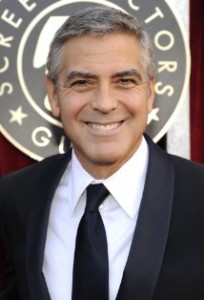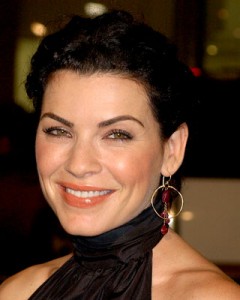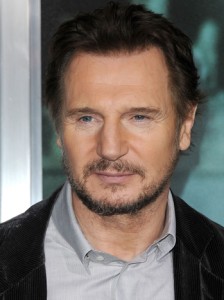Happy Holidays everyone. I’m on a three or four week break from writing. My first guests – one son and two cats – arrived Sunday night. More visitors to follow this weekend. I vow to plunge back into writing in early January. If our cold spell here in Calgary continues I’ll be glad to stay inside and write. I wish you all a happy and healthy 2013. 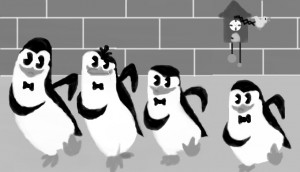
Charlotte Bronte’s parasol – follow up
Here’s a feel-good blogging story for the Holidays.
In August, I wrote a blog post about Charlotte Bronte’s umbrella owned by my aunt in New Brunswick. Aunt Edith has been trying for years to get the umbrella to the Bronte museum in Haworth, West Yorkshire, UK. Her efforts have been stalled due to the umbrella handle being constructed of ivory, a banned substance.
A few days after the post, I was surprised to receive an e-mail from Julie Akhurst on behalf of the Bronte Parsonage Museum. My post had appeared in their Google Alert for anything remotely connected to the Brontes. Julie said the staff had read my account with fascination and remembered the case clearly. The person who was dealing with it at their end left shortly afterwards and the correspondence lapsed. They were now keen to revive it. Could I put them in contact with my aunt?
I e-mailed my aunt, who got in touch with Julie. The two are now occupied in sending correspondence and forms back and forth and the museum is dealing with government departments. It turns out that my aunt had the umbrella examined by a local expert, who determined the handle substance was bone, not ivory. This kind of bone is not a banned or restricted animal substance, which means that the parasol can be sent without a CITES license. The umbrella will, as Aunt Edith puts it, go home where it belongs.
The museum’s interest got me curious about exactly how my aunt came into possesson of the umbrella, which, it seems, is more accurately a parasol.
Here’s Aunt Edith’s explanation:
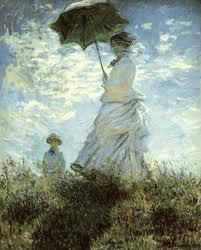
Julie Akhurst says she’ll keep me posted on the museum’s progress. She thanked me for my helpful post and added that, without it, the parasol would have been forgotten.
I expect the parasol would have made it to the museum eventually, but I’m glad to be part of the story.
Happy Holidays to everyone. I hope that you, like Charlotte Bronte’s parasol, make it home, if not literally, then in your heart.
Next Big Thing
My fellow Touchwood author, Kay Stewart, invited me to participate in this blog tag. Check out Kay’s answers to the intriguing and sometimes challenging interview questions. Here’s what I have to say about my work-in-progress.
What is your working title of your book? Ten Days in Summer
Where did the idea come from for the book? When I realized that Deadly Fall could be the start of a mystery series, I decided the next three books would take place in different Calgary seasons, not necessarily in linear order. For summer in Calgary, I instantly thought of the Calgary Stampede and had an idea that the mystery would be triggered by an incident at the Stampede parade.
What genre does your book fall under? Murder mystery, traditional whodunnit, semi-professional sleuth.
Which actors would you choose to play your characters in a movie rendition? In reality, we wouldn’t get major box office stars. Since this is a fantasy, I can see George Clooney as Sam. For Paula, my protagonist, why not reprise Clooney’s ER television series romance with Julianna Margulies? With her dark hair, she looks a little like I imagine Paula. I’m not so up on thirty-ish actors who might play Detective Mike Vincelli. Who’s today’s young Liam Neeson?
What is the one-sentence synopsis of your book? Insurance adjuster, Paula Savard, investigates the suspicous house fire death of a hoarder.
Will your book be self-published or represented by an agency? The publisher of Deadly Fall, Touchwood Editions, is currently reading the manuscript.
How long did it take you to write the first draft of your manuscript? I wrote the first half of the first draft in about two months, set it aside for eight months, then returned to the beginning and wrote the new first draft in about four months. I think. It feels like so long ago, since I wrote three revisions after that before sending it to the publisher.
What other books would you compare this story to within your genre? Gail Bowen’s sleuth, Joanne Kilbourn, is also a fifty-something non-police woman living in a Canadian prairie city. Like Paula’s stories, Joanne’s revolve around her family, friend and colleague relationships as much as they do the mystery.
Who or what inspired you to write this book? The Calgary Stampede and hoarders of varying degrees in my family.
What else about your book might pique the reader’s interest? The mystery’s connection to a fact of Alberta history.
Starting the week of Dec 17th, visit this awesome Calgary author for her very different answers to the same questions.
Lori Hahnel http://lorihahnel.blogspot.ca/
Literary London – Sherlock Holmes made real
Fans of Sherlock Holmes know that the fictional detective lived at 221b Baker Street, London, UK. In October, Will and I took the tube to the famous street and were greeted by a statue of the detective, erected by the Sherlock Holmes Society – our first clue that we’d got off at the right stop.
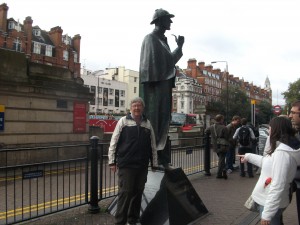
In 1990, the Society bought the building at 221b Baker and opened the Sherlock Holmes Museum.
Inside, they’ve recreated the boarding house rooms as they might have looked when occupied by Holmes, his colleague Dr. Watson, and his landlady Mrs. Hudson, based on details gleaned from the Holmes’ stories. Holmes’ bedroom was at the rear, adjoining the study … Doctor Watson’s bedroom was on the second floor next to Mrs. Hudson’s room and it overlooked an open yard at the rear of the house. The sitting room overlooking Baker street was, by Watson’s account, “illuminated by two broad windows,” and there were seventeen steps from the ground floor hallway to the first floor study.
Did the Sherlock Holmes Society alter the building to faithfully match the story details? They better had, since Holmes’ legion of fans are likely to share their hero’s attention to detail and precision.
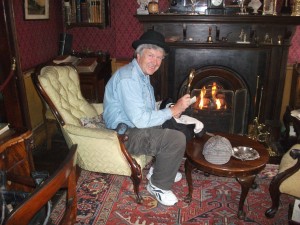
Unless you’re an avid Holmes fan, you’ll likely to find the museum overpriced. As much as the Holmes’ connection, I enjoyed it for the glimpse of a typical Victorian boarding house – an interesting contrast to the more commonly preserved home tours of the rich. Homes’ and Watson’s rooms were small and cramped.
The boarding house’s rooms contain memorabilia from Holmes’ and Watson’s adventuress, objects they were reported to have used and letters from readers asking for help with solving their own mysteries. You’d think living, breathing Holmes and Watson had lived here. Throughout the house, wax figures portray scenes from the stories.
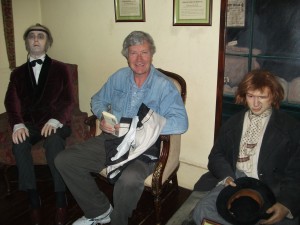
Outside, on the front fence, hang deerstalker and bowler hats so you can be Holmes and Watson standing in front of the famous address. If you’re lucky, a constable will appear to complete the picture.
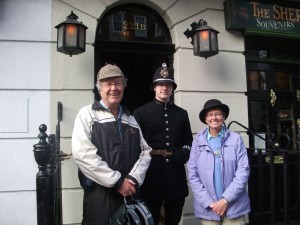
Literary York – Richard 111: villain or villified?
In his famous play, William Shakespeare portrayed Britain’s King Richard lll as the ultimate villain. During Richard’s Machiavellian rise to power and short reign, he orders the murder of his older brother, two nephews and eight other people standing in his way. Even for Shakespeare, that’s a large body count.
Shakespeare’s portrait of Richard lll has persisted through the centuries, but is it accurate? Did Shakespeare villify Richard for his own, dubious reasons?
The Richard lll Museum in York, England, asks this question. It interests them because Richard was the last king of the House of York.
The museum’s setting is cool – a gatehouse in the Medieval walls that circle the city of York. The museum walls are lined with arguments for and against Richard. A dummy of the king sits on a mock court stand, on trial for the murder of his nephews. You listen to an audio recording of lawyers for the prosecution and denfense cross-examining Richard. At the end you’re invited to vote “yes” or “no” for Richard’s guilt. It’s fun, inexpensive and educational.
Under oath, Richard admits that he ordered the boys’ imprisonment in the Tower of London. Yes, he had motive to kill them. They were the rightful heirs to the throne and as long as they lived they could become a focus for Richard’s enemies to rally behind. And, yes Richard admits he had those nine other people killed and the boys have disappeared from the Tower. This doesn’t prove he had them killed. Someone might have done it without his knowledge. The leader doesn’t always know what his supporters are up to.
It’s possible, too, the boys died of natural causes – natural causes were common in those days and imprisonment was likely not good for their health. Richard and his supporters might have thought their enemies wouldn’t believe they weren’t responsible and whisked the bodies away. Or it was a conspiracy by Henry Tudor, who defeated Richard and established the Tudor royal line. Henry might have had the boys killed, knowing Richard would get the blame.
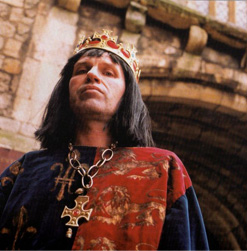
In the long term, Richard’s biggest enemy was Shakespeare. The bard described Richard as an ugly hunchback. There’s no evidence for this and, sadly, in Shakespeare’s day physical deformity was viewed as a sign of evil inside. Richard’s modern supporters claim Shakespeare portrayed Richard as a villain in order to suck up to his patron, Elizabeth l, a Tudor and granddaughter of Henry Vll, Richard’s conquerer. As victors always do, the Tudors re-wrote history to present the loser as evil and wrong. Shakespeare, a product of his times, believed the prevailing myth. In any event, Shakespeare wrote fiction, not history. Why let the facts stand in the way of a good and bloody story?
The Ricardians, as they call themselves, make a valid point. We shouldn’t view Shakespeare’s version as accurate history. And quite likely, to gain the crown, Henry Tudor did things every bit as nasty as Richard did, but managed to keep them hidden. Certainly his son, Henry Vlll, didn’t shy away from bloody beheadings. But that doesn’t mean Richard was innocent of the boys’ murders. To remain secure in his power, he’d have to get rid of his nephews, just as the Bolsheviks killed the entire Russian royal family so that there could be no going back. I voted “yes” for Richard’s guilt. Sorry, York.
If you think Shakespeare, not Richard, was the real villain, you can join The Richard lll Foundation and help rehablitate Richard’s name. Will the recent discovery of bones believed to be Richard’s – with a Canadian connection – resolve the question?
Literary England – Jamaica Inn
Will and I are both fans of writer, Daphne duMaurier. Her novel Rebecca is one of my all-time favourite books. I recently read it for the third time and, over the the years, I’ve seen several T.V. and movie versions. Even though I knew what was going to happen, the story gripped me to the end. A few aspects here and there were dated but, for the most part, I was impressed by DuMaurier’s writing skill and feel it holds up to today’s standards.
Most of DuMaurier’s novels are set in Cornwall or Devon in the U.K. Since Will and I would be spending a week in Cornwall, we brought along a copy of DuMaurier’s novel Jamaica Inn for our travel reading. Both of us had read it before, but couldn’t remember the details. I read the book on the plane going over. Will finished it the day before we visited the real-life Jamaica Inn, which inspired the story.
Click on the Jamaica Inn website and you hear a creak, creak, creak meant to put you in the mood for a creepy experience. In the novel, DuMaurier’s protagonist goes to live with her aunt, her only living relative, at Jamaica Inn. The aunt’s husband is a brute. While his loutish comrades come to the inn to drink, no one ever stays there. Is the inn is a cover for shady business? This turns out to be smuggling.
Today, people stay at the inn. I don’t know that I’d want to after reading the novel and seeing the place. A big draw is its rumoured hauntings.
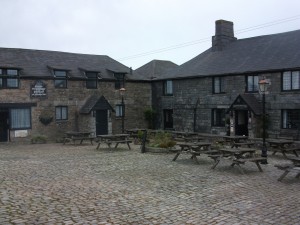
At the inn, we visited the Daphne duMaurier Smugglers musuem. It presents a good history of smuggling in Cornwall which persisted to the 1960s and, perhaps, into more recent times. Displays show objects used to conceal drugs and other smuggled items.
The other part of the museum focusses on Daphne DuMaurier’s life. Her father was an actor who was so famous in his time that a tobacco company named their cigarette brand after him. You can see Daphne DuMaurier’s writing room and watch an interview with her son, who talks about why a Londoner like his mother felt at home in Cornwall.
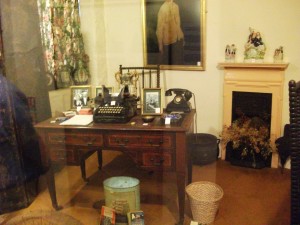
After visiting Jamaica Inn and learning about smuggling in Cornwall, I understand how both would have fired the writer’s imagination. Lots of scope for drama, romance and rivetting story.
Jamaica Inn was well worth a visit, but I spent the night at an inn with no ghosts.
Theatre in the sky
Does Gilbert and Sullivan qualify as part of my literary tour of England? The operettas were written and published.
I didn’t, by the way, go to Britain for the purpose of visiting the literary-related sites I’ve been blogging about this fall. It’s just that, in the U.K. you can hardly walk without tripping over a reference to a literary figure, be it a home he once lived in, a place that inspired her or a statue or plaque.
Daphne du Maurier, who is associated with Cornwall, grew up in Hampstead, an attractive suburb in northwest London. We rode the bus to Hampstead on our last day in Britain. We didn’t see DuMaurier’s former home, but there’s probably a plaque on the building, like the one that surprised us when we exited Hamstead Heath park.
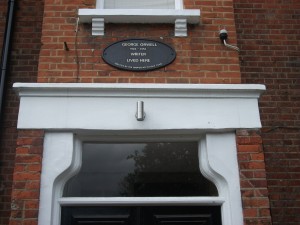
We also walked by a Hampstead home once occupied by poet, John Keats.
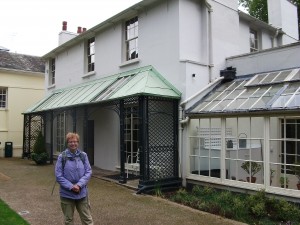
Back to Gilbert & Sullivan. In Cornwall, we saw a performance of their operetta, Ruddigore, at the Minack Theatre, billed as Cornwall’s theatre under the stars. The Minack is an open air amphitheatre set on a cliff on the Cornwall coast. It took a woman of vision to come up with the idea in the 1930s of building a outdoor theatre in a rainy climate at a barely accessible location, but the Minack endured and thrived. Our performance was almost sold out.
Most people had bought their tickets in advance, but we waited until the day of the event to make sure we got a clear night. But clear nights in Cornwall usually mean windy. Our four layers of clothes plus gloves and hats kept us almost warm enough.
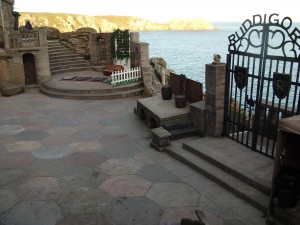
Ruddigore was a Gilbert & Sullivan show that I hadn’t seen before. It has the usual G & S improbable premise and plot. In Ruddigore, a baron is cursed to do an evil deed a day or die. He fakes his death, forcing his brother to take his place. Complications arise as he is found out.
The play seemed a little darker than other Gilbert & Sullivans I’d seen, although this might have been the Cambridge University performers’ interpretation. The actors did an excellent job, especially the two playing the brothers.
That night in Cornwall, there was too much ambient light to see stars in the sky, but Minack was a unique theatre experience.
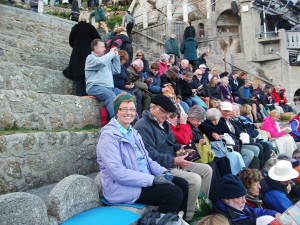
Literary England – Tintagel Castle
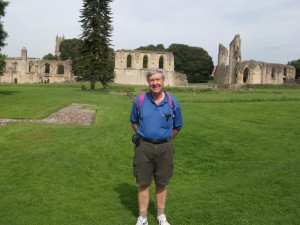
Everyone wants a piece of Arthur. In the Middle Ages, when Glastonbury Abbey faced financial ruin, the monks came up with a clever scheme. They “discovered” the bones of King Arthur and Lady Guenevere. This attracted public interest and, more importantly, money that saved the abbey. Today, tourists at Glastonbury Abbey can view the burial sites.
Arthur’s story was the stuff of much Medieval literature. It was later revived by Romantic and Victorian writers, notably, Tennyson with The Lady of Shalott and Idylls of the King. The story was re-worked for modern times in movies and plays: Disney’s The Sword in the Stone, Monty Python and the Holy Grail and Camelot.
Thanks to Camelot, I had formed a pastoral image of Arthur’s castle. It’s quite the opposite, if Tintagel was the place. This fall, Will and I stopped at Tintagel on our way from Wales to Penzance, in Cornwall. A genuine castle once existed at Tintagel. Now it’s ruins. Arthur’s castle is rumoured to have preceded it. Whether or not that’s true, the setting is gorgeous and wild, with sweeping views – well worth a visit. It’s also a rigorous hike up those cliffs.
Camelot simmered and exploded with human passion. Now that I’ve seen Tintagel, I get it.
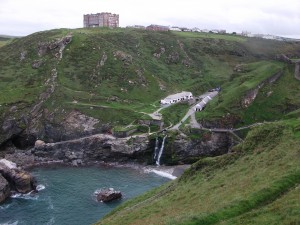
Free Writing Workshop
Saturday, Nov 17, 1:00 – 3:00 p.m.
Join me and fellow Calgary writer, Garry Ryan, for an interactive workshop on making your characters come alive and about using E-Resources. Bring your questions and meet other writers. Everyone welcome. Workshop takes place at the Calgary Public Library, Central Branch, 616 Macleod Trail S.E. You’ll get to see my first ever power point presentation. To register visit Calgary Public Library .
Literary Wales – Tintern Abbey
Tintern Abbey is a major tourist attraction in southeast Wales. Will and I saw directional signs for it on the highway while driving to Wales from Britain. Tour buses visit. The abbey is a ruin, so I didn’t how much there’d be to see when we went. But, I wanted to go. At university, I’d studied Wordsworth’s famous poem “Tintern Abbey.” What I’d remembered about it, was that he’d visited the abbey with his younger sister and viewed it fresh through her new eyes.
In preparation for the trip, I re-read the poem. It helped that the copy I had was in a book I’d bought years ago second-hand. The original owner had obviously used it as a student. Her scribbled note in the margins deciphered some of the poem’s meaning. Among other things, it’s a religious poem. Wordsworth talks of seeing god in nature and how this sustains him through life’s difficult, depressing and dreary times.
We went to Tintern Abby on a morning that was crystal clear blue. Few other tourists were there. The adjacent town, while focussed on tourism, was attractive, rather than commercial. Quite a lot of the the abbey’s stonework remains and the site offers details on abbey life.
I’d love to spend a couple of days in Tintern, so I could hike up to a viewpoint overlooking the abbey and see it lit up at night.

Did seeing Tintern Abbey help me better understand Wordsworth’s poem? One thing strikes me now. The poem doesn’t mention the abbey at all, except in the title, the full wording of which is: Lines written a few miles above Tintern Abby, On revisiting the banks of the Wye during a tour, July 13, 1978.
A few miles above … was the poet even viewing the abbey when he composed the poem? His images all relate to nature. I wonder if he used the abbey’s name in the poem’s title to draw a parallel: just as conventionally religious people feel God through religious buidlings, nature was Wordsworth’s church.
